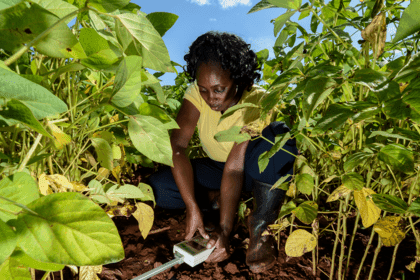
Over £14m funding awarded to link climate and health data in a global digital platform
The world’s largest health information management system has been awarded funding to integrate climate and health data to help predict the health impacts of climate change.
Wellcome is committing nearly £14.5 million to DHIS2, to bring climate data into the platform and combine it with health data, to better understand and prepare for the impacts of climate change on human health and to strengthen the governance and sustainability of the infrastructure itself.
DHIS2 is an open-source platform for collecting and analyzing national- and local- health data, run by a team at the University of Oslo. The platform is used in more than 100 countries around the world, meaning some 3.2 billion people or 40% of the world’s population live in countries where DHIS2 is used. The digital health system brings together a variety of data – which is used by ministries of health, local authorities and healthcare workers in the field to enable better planning, information sharing and decision-making.
The grant to DHIS2 comes ahead of the first ever Health Day at a COP, taking place on Sunday 3 December during COP28, where the serious effects of climate change on health around the world will come under focus. Countries are expected to sign up to the first ever declaration on climate and health, pledging to strengthen their work to mitigate and adapt to climate change and better integrating health considerations into climate policy.
This funding will support countries using DHIS2 to strengthen the climate resilience of their health systems by integrating climate and meteorological data with health data. The DHIS2 team will develop tools to analyse and model this data in a form easily accessible to decision makers. Through the development of early warning systems to forewarn of the local impacts of climate change, local and national authorities could use this data to improve responses to extreme weather events, such as heat or flooding, or outbreaks of climate-sensitive infectious diseases, and support communities vulnerable to food insecurity and malnutrition.
DHIS2 already has evidence that this approach works. Malawi has implemented a DHIS2 system for climate resilient food security, which integrates local crop and weather data. The locally collected data is used to make short-term and seasonal projections, and generate early warnings for farmers about local weather events such as flood and droughts so they can take action to safeguard their crops. The DHIS2 system allows the government to identify and warn specific households at risk, and plan larger-scale and one-off safety interventions such as evacuations or region-wide irrigation.
In Laos and Mozambique pilot projects have also combined climate data with health data using DHIS2 to generate early warnings for infectious diseases that are sensitive to climate change. In Laos, historical and current daily weather data has been integrated with disease data to track trends and project potential outbreaks of diarrhoea and dengue, while initial work using this approach in Mozambique has generated malaria outbreak warnings four to eight weeks in advance.
Tariq Khokhar, Head of Data for Science and Health at Wellcome, said: “The changing size, age and geographic distributions of populations worldwide, coupled with the effects of climate change, demand more effective digital health systems to support the planning and delivery of care. DHIS2 is by far the most widely deployed health information management system, and the team brings a holistic, socio-technical approach to its development and implementation, working closely with the communities they support. We’re pleased to be supporting the team to develop and maintain this essential digital health infrastructure, which will help deliver effective healthcare and high-quality research to understand and adapt to the effects of climate change on human health.”
Professor Kristin Braa, director of the HISP Centre at the University of Oslo, where the DHIS2 project is based, said: “We and our global network are very excited about this project. It is a natural development of the work we have been doing with DHIS2 for disease surveillance, including during the COVID-19 pandemic, and we think it will help countries meet the global climate crisis.”
Dr. Chansaly Phommavong, Deputy Director General of the Department of Planning and Finance of the Laos Ministry of Health also welcomed the news of this award, stating: “The Ministry of Health regards climate change and its impact on health as one of our most important challenges. We look forward to expanding our work with DHIS2 to develop ways to combine and analyse climate and health data to better understand disease trends related to climate change."
In many low-resource settings there are still gaps in the availability of local climate data, especially in digital form. To overcome this barrier, the DHIS2 team will collaborate with health ministries, local universities, research teams and healthcare workers, as well forging new partnerships with national meteorological agencies.
Strengthening DHIS2
Wellcome’s funding will also strengthen the governance and sustainability of the DHIS2 infrastructure itself. With the number of countries using the platform increasing and the size of DHIS2 implementations growing, funding will go towards enhancing the core platform to make it more secure, user-friendly, and scalable. The work will also fortify the governance and transparency, including improving processes for collecting community feedback and managing technical changes, and supporting the long-term sustainability of the system.
Climate and health are intrinsically linked, so there is an urgent need for climate-informed health information management systems. Integrating climate data into an already widely used platform like DHIS2 and improving the infrastructure to support its long-term large-scale use is an important way to help predict and prepare for the impacts of climate change on health and protect those most at risk of these impacts.
Notes to Editors
A list of preliminary countries under consideration for this project is available upon request.
Wellcome and PATH are hosting a side panel event at COP28 on ‘Digital public goods for understanding & addressing climate impact on health’ at The Health Pavillion, Blue Zone. For more information, please contact Grace Annan-Callcott (g.annan-callcott@wellcome.org) and Simon Hall (s.hall@wellcome.org).
Read more about what Wellcome is doing at COP28: https://wellcome.org/cop28
About Wellcome
Wellcome supports science to solve the urgent health challenges facing everyone. We support discovery research into life, health and wellbeing, and we’re taking on three worldwide health challenges: mental health, infectious disease and climate and health.
